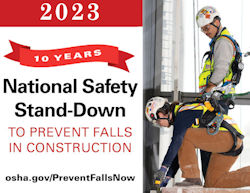What is a Fall Hazard?
Definition
Fall hazards are present at most worksites, and many workers are exposed to these hazards on a daily basis.
A fall hazard is anything at your worksite that could cause you to lose your balance or lose bodily support and result in a fall. Any walking or working surface can be a potential fall hazard.
Any time you are working at a height of four feet or more, you are at risk. OSHA generally requires fall protection be provided at four feet in general industry, five feet in maritime and six feet in construction. However, fall protection must be provided at any height when working over dangerous equipment and machinery.
Examples
Fall hazard incidents are injuries produced by impact between the injured person and the source of injury when the motion producing contact was generated by gravity.
Fall hazards in construction cause accidents, such as the following:
- A makeshift scaffold collapsed under the weight of four workers and their equipment, seriously injuring all four.
- A worker carrying a sheet of plywood on a flat roof stepped into a skylight opening and fell to the level below.
- A roofer, while attempting to remove a roof opening cover, fell approximately 21 feet to the concrete floor below and was killed.
- A construction worker was working on a carpenters' wall bracket scaffold without fall protection. The worker fell 19 feet to the ground, sustained blunt trauma to the head and later died.
Knowledge Check Choose the best answer for the question.
1-1. At what height is fall protection generally required when working above dangerous equipment?
You forgot to answer the question!

